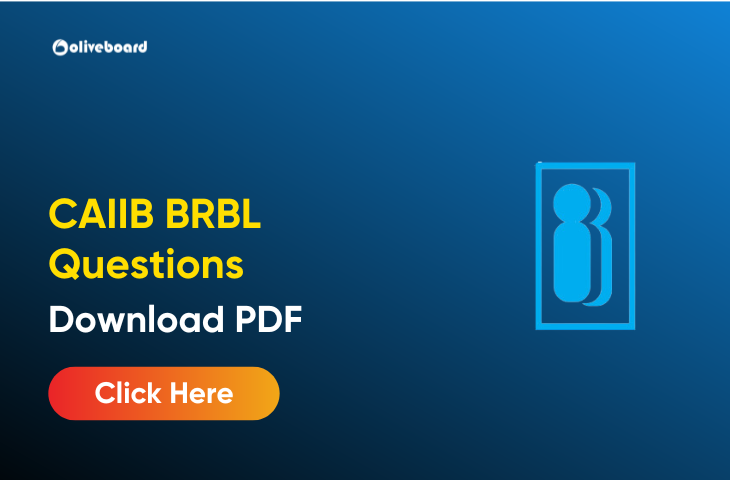CAIIB BRBL Questions: The CAIIB BRBL (Banking Regulations and Business Laws) exam is one of the essential modules in the Certified Associate of Indian Institute of Bankers (CAIIB) certification. It is designed to improve a banking professional’s knowledge and understanding of banking laws and regulations. In this article, we will cover the most commonly asked CAIIB BRBL questions, along with detailed solutions and answers, to help candidates prepare effectively.
CAIIB BRBL Exam
The CAIIB BRBL exam focuses on various banking regulations, legal provisions, and the functioning of banks in India. It is a vital paper for any banker who wants to expand their professional knowledge in the banking sector. The CAIIB BRBL Questions test the understanding of laws governing banking practices, customer protection, legal disputes, and more.
Also Check, CAIIB BRBL Capsule Batch Demo Class 2024, CAIIB BRBL Last 7 Days Strategy
Important Topics in CAIIB BRBL
Before diving into the CAIIB BRBL Questions with solutions, let’s first outline the key topics that are frequently tested:
- Banking Regulation Act, 1949
- Reserve Bank of India (RBI) Acts and Regulations
- Negotiable Instruments Act, 1881
- Consumer Protection Act, 1986
- Indian Contract Act, 1872
- Law of Contracts and Banking Transactions
- Banking Ombudsman Scheme
These topics are the foundation of the CAIIB BRBL Questions and solutions, making it crucial for candidates to familiarize themselves with them thoroughly.
Frequently Asked CAIIB BRBL Questions
Here are some of the frequently asked CAIIB BRBL Questions, along with detailed solutions:
1. What is the Banking Regulation Act, 1949?
Solution: The Banking Regulation Act, 1949 is an essential law that governs the functioning of banks in India. It empowers the Reserve Bank of India (RBI) to regulate the activities of both commercial and cooperative banks. The Act covers various aspects such as the licensing of banks, management of banks, and the regulation of the banking business.
Key Points:
- Section 22 of the Act provides for the licensing of banks.
- The RBI is the regulatory authority under this Act.
- It also includes provisions for the inspection and management of banks.
2. What is the difference between a ‘Cheque’ and a ‘Demand Draft’?
Solution: A Cheque is a negotiable instrument that orders a bank to pay a specific amount from a payer’s account to a payee. It can be dishonored if there are insufficient funds in the payer’s account.
A Demand Draft (DD), on the other hand, is a prepaid instrument where the payment is guaranteed by the issuing bank. It cannot be dishonored as it is drawn against the bank’s funds.
Key Differences:
| Feature | Cheque | Demand Draft |
| Payment Guarantee | Not guaranteed | Guaranteed by bank |
| Issuer | Drawer (payer) | Issuing bank |
| Risk of Dishonor | Yes, due to insufficient funds | No, as it’s prepaid |
| Transferability | Transferable | Non-transferable |
3. What are the key provisions of the Negotiable Instruments Act, 1881?
Solution: The Negotiable Instruments Act, 1881 deals with the laws related to negotiable instruments such as cheques, promissory notes, and bills of exchange. It defines the rights, duties, and responsibilities of the parties involved in transactions using these instruments.
Key Provisions:
- Defines negotiable instruments and their characteristics.
- Provides for the dishonor of negotiable instruments and the legal remedies available.
- Deals with the rights of holders in due course, which includes the right to receive payment despite the original holder’s default.
4. What is the Banking Ombudsman Scheme?
Solution: The Banking Ombudsman Scheme was introduced by the Reserve Bank of India to address complaints from customers of banks. The scheme aims to resolve disputes between the customer and the bank in an impartial and quick manner.
Key Features:
- The Ombudsman can address issues such as deficiency in services, non-payment of dues, and improper behavior by bank staff.
- It is a free service provided by RBI.
- Customers can file complaints under the scheme if they are dissatisfied with the resolution provided by the bank.
5. What is the role of the Reserve Bank of India (RBI) in banking regulations?
Solution: The Reserve Bank of India (RBI) plays a critical role in regulating and supervising the banking system in India. It ensures that banks operate within the legal framework set by the government and are financially sound.
Key Roles:
- Licensing and regulating banks.
- Issuing guidelines on the management of banking institutions.
- Formulating monetary policy.
- Ensuring financial stability in the banking system.
What’s there in the CAIIB BRBL Questions with Detailed Solutions E-book?
Ques 1. Which Act regulates the business of banking in India?
A. Companies Act 1956
B. Banking Regulation Act 1949
C. Reserve Bank of India Act 1934
D. Securities and Exchange Board of India Act 1992
Solution: B. Banking Regulation Act 1949
Ques 2. Who is responsible for licensing banks in India?
A. Government of India
B. Reserve Bank of India
C. Ministry of Finance
D. Securities and Exchange Board of India
Solution: B. Reserve Bank of India
Ques 3. Which of the following is NOT a type of bank in India?
A. Commercial Banks
B. Investment Banks
C. Cooperative Banks
D. Public Sector Banks
Solution: B. Investment Banks
Ques 4. Which of the following is the statutory authority for regulating Non-Banking Financial Companies (NBFCs) in India?
A. Reserve Bank of India
B. Securities and Exchange Board of India
C. National Bank for Agriculture and Rural Development
D. Insurance Regulatory and Development Authority of India
Solution: A. Reserve Bank of India
Ques 5. What is the minimum capital requirement for a commercial bank to obtain a banking license in India?
A. Rs. 50 crore
B. Rs. 100 crore
C. Rs. 200 crore
D. Rs. 500 crore
Solution: B. Rs. 100 crore
Ques 6. What is the role of the Reserve Bank of India in the Indian banking sector?
A. Issuing of bank notes
B. Setting monetary policy
C. Licensing banks
D. All of the above
Solution: D. All of the above
Ques 7. Which of the following is a core function of a bank?
A. Investment in mutual funds
B. Accepting deposits and lending loans
C. Providing insurance policies
D. Trading in securities
Solution: B. Accepting deposits and lending loans
Ques 8. Which type of bank is owned and operated by the Government of India?
A. Commercial Bank
B. Cooperative Bank
C. Public Sector Bank
D. Private Sector Bank
Solution: C. Public Sector Bank
Ques 9. What is the primary objective of the National Bank for Agriculture and Rural Development (NABARD)?
A. Regulation of non-banking financial institutions
B. Promoting agricultural and rural development
C. Managing foreign exchange reserves
D. Overseeing insurance companies
Solution: B. Promoting agricultural and rural development
Ques 10. What does the term “Banker’s Draft” refer to?
A. A loan provided by a bank
B. A document instructing payment of a specified amount
C. A short-term investment instrument
D. A cheque drawn on the personal account of the bank
Solution: B. A document instructing payment of a specified amount
Ques 11. Which of the following is NOT a type of financial institution in India?
A. Commercial Bank
B. Non-Banking Financial Company (NBFC)
C. Insurance Company
D. Mortgage Bank
Solution: D. Mortgage Bank
Ques 12. Which of the following is true regarding the “Know Your Customer” (KYC) norms?
A. KYC is applicable to only corporate accounts
B. KYC norms help prevent money laundering
C. KYC is optional for all account holders
D. KYC is not required for online banking transactions
Solution: B. KYC norms help prevent money laundering
Ques 13. What does the acronym “CRR” stand for in banking?
A. Central Reserve Requirement
B. Cash Reserve Ratio
C. Credit Risk Ratio
D. Central Regulation Reserve
Solution: B. Cash Reserve Ratio
Ques 14. The Reserve Bank of India is empowered to impose restrictions on the activities of a bank under which section of the Banking Regulation Act 1949?
A. Section 22
B. Section 35A
C. Section 42
D. Section 56
Solution: B. Section 35A
Ques 15. Which of the following types of banks cannot accept demand deposits (such as deposits that can be withdrawn by cheque)?
A. Scheduled Banks
B. Commercial Banks
C. Cooperative Banks
D. Non-scheduled Banks
Solution: D. Non-scheduled Banks
Ques 16. Which of the following is the primary role of the Financial Intelligence Unit (FIU)?
A. Licensing of banks
B. Overseeing insurance companies
C. Preventing money laundering
D. Regulating the stock market
Solution: C. Preventing money laundering
Ques 17. What is the maximum limit for a savings account in terms of deposits under the Banking Regulation Act?
A. Rs. 50,000
B. Rs. 1 lakh
C. No limit
D. Rs. 5 lakh
Solution: C. No limit
Ques 18. Which of the following is true about the banking system in India?
A. There are only public sector banks
B. Private sector banks are not allowed to operate in India
C. Cooperative banks are only for rural areas
D. Banks can operate both in urban and rural areas
Solution: D. Banks can operate both in urban and rural areas
Ques 19. What is the primary purpose of the Payment and Settlement Systems Act, 2007?
A. To regulate the functioning of stock exchanges
B. To provide legal framework for digital payments and settlement systems
C. To regulate insurance companies
D. To oversee bank mergers and acquisitions
Solution: B. To provide legal framework for digital payments and settlement systems
Ques 20. What is the purpose of the Priority Sector Lending (PSL) guidelines issued by RBI?
A. To encourage loans for sectors like agriculture, housing, and education
B. To restrict lending to non-essential sectors
C. To regulate foreign bank operations in India
D. To set capital requirements for banks
Solution: A. To encourage loans for sectors like agriculture, housing, and education
Also Check, Tips to score 90+ marks in CAIIB BRBL
Download the Free E-book
Click the link below to get your free PDF instantly.
Sneak Peek into the E-book
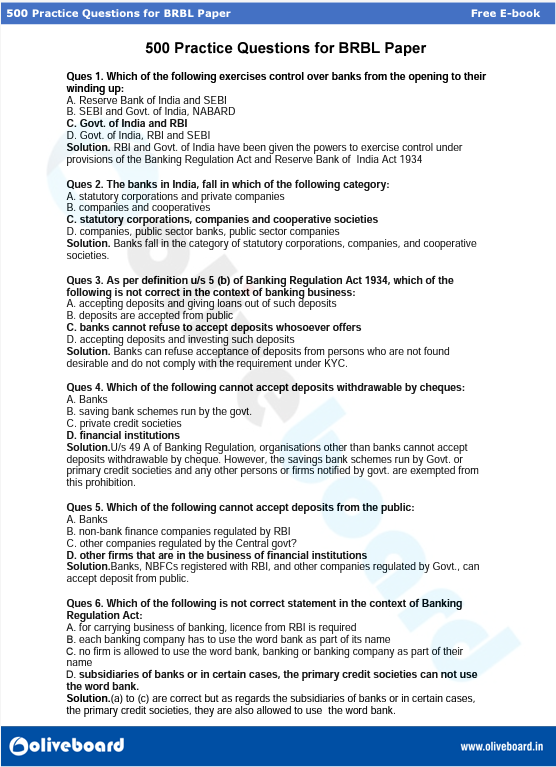
How to download the Free E-book?
1: Click on the download link. You will be taken to Oliveboard’s FREE E-Books Page.
2: Register/Login to the Free E-Books Page of Oliveboard (It is 100% free, You just enter your valid email ID and a password to be able to download the pdfs.
3: After Logging in, you will be able to download the free e-book by clicking on “click here” as shown in the snap below.
CAIIB BRBL Exam Preparation Tips
Preparing for the CAIIB BRBL exam requires a structured approach. Here are some tips that can help you ace the exam:
1. Understand the Concepts Clearly
It is important to understand the key banking laws and regulations. Do not just memorize the sections, but try to grasp their practical implications.
2. Refer to Study Material and Previous Papers
Make use of standard textbooks and study guides, along with previous years’ CAIIB BRBL questions. Solving past papers will help you understand the exam pattern and frequently tested areas.
3. Make Use of Online Resources
There are plenty of online courses and resources available, including video tutorials, webinars, and mock tests, which can make preparation more engaging and effective.
4. Practice Time Management
Time management is critical for CAIIB exams. Practice answering questions within the stipulated time frame to enhance your speed and accuracy.
Conclusion
We hope this blog gave you all the details regarding the 500 Practice Questions for BRBL Paper. To read more such blogs, visit the Oliveboard website!
Also Read:
| Related Article | Link |
| Top 50 Most Repetitive CAIIB ABM MCQs | Click here to Check |
| Top 50 Most Repetitive CAIIB BFM MCQs | Click here to Check |
| Top 50 Most Repetitive CAIIB BRBL MCQs | Click here to Check |
| ABM Exam Important MCQs | Click here to Check |
| Top 50 Most Repetitive CAIIB ABFM MCQs | Click here to Check |
- CAIIB Electives Exam Analysis 2025, June All Shifts Review
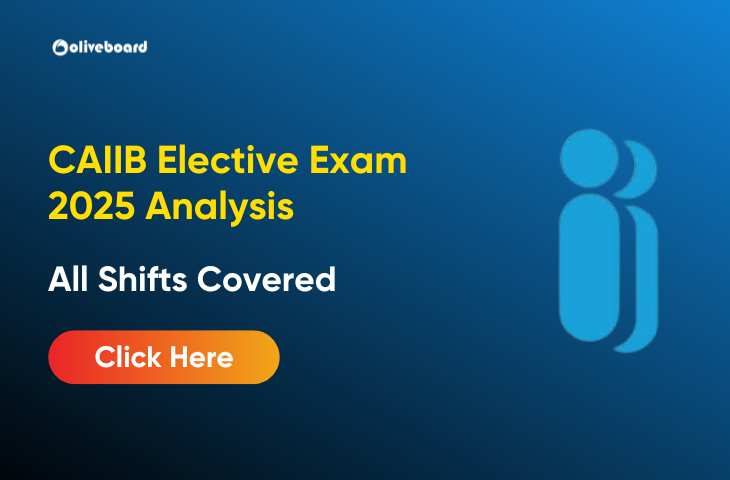
- CAIIB BRBL Exam Analysis 2025, June All Shifts Review
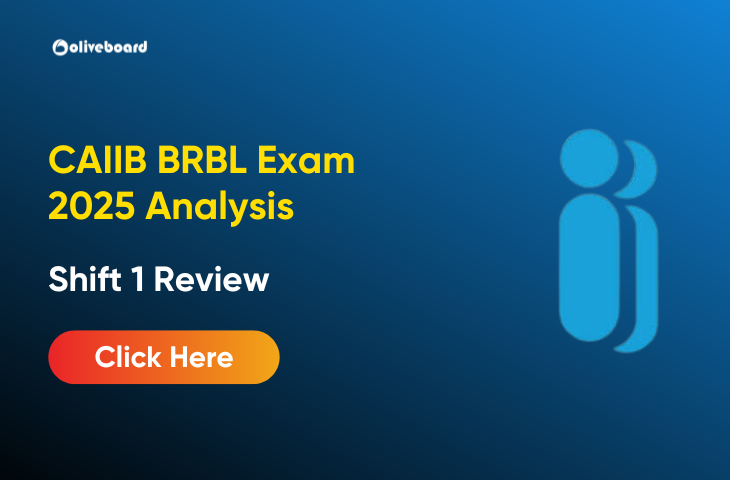
- CAIIB ABFM Exam 2025 Analysis, Shift 1 & 2 – 22nd June 2025

- CAIIB BFM Exam Analysis 2025, All Shift Analysis Released

- CAIIB ABM Exam Analysis 2025, All Shifts, May-June Cycle
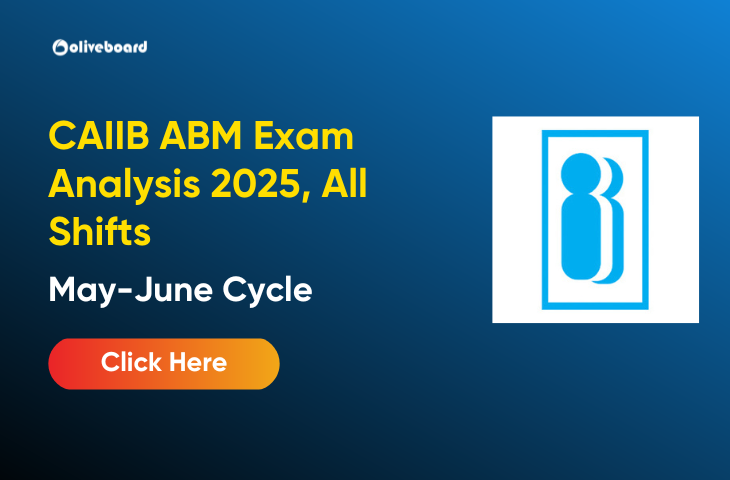
- CAIIB Admit Card 2025, Check Steps to Download Call Letter


Hello there! I’m a dedicated Government Job aspirant turned passionate writer & content marketer. My blogs are a one-stop destination for accurate and comprehensive information on exams like Regulatory Bodies, Banking, SSC, State PSCs, and more. I’m on a mission to provide you with all the details you need, conveniently in one place. When I’m not writing and marketing, you’ll find me happily experimenting in the kitchen, cooking up delightful treats. Join me on this journey of knowledge and flavors!
